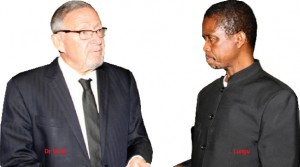 By SAMUEL NGOMA –
By SAMUEL NGOMA –
A DEPUTY minister has never seen the inside of a Cabinet meeting and that’s because he’s not eligible to attend Cabinet.
A deputy minister is not even allowed to act as minister whenever the substantive minister (his boss) is away.
A deputy minister, no matter how publicly acceptable, is not permitted to issue instructions to the permanent secretary at any given time because the latter is only answerable to the Cabinet minister.
That’s just the way things are in the art and science of Government. A deputy minister must always wait for his time instead of being a tad too eager to be President.
He may defiantly be his own man and cover himself in glory from uninformed grass-root cadres but Government structuring is there as forensic proof that for one whose rise was only up to deputy minister level and never a big part of Government furniture, he would most certainly be a junior president on the international scene if elected as Head of State!
Like in media houses where senior reporters do not attend editorial conferences, imagine the shock if one attended and started issuing instructions to editors! Or a manager in a parastatal firm suddenly jumping over senior managers and directors to berate them in a meeting where he is excess to requirements.
Therein also lies the curiously unexamined cruel nuance between Acting Republican President, Dr Guy Scott and PF leader, Mr Edgar Lungu.
Any perceived differences they have may be psychological as a result of Mr Lungu having once served as Dr Scott’s deputy minister in the Vice-President’s office shortly after PF’s ascendancy to power!
Generally, it’s a big ask to expect Cabinet ministers to rally under a deputy minister. Anything but!
Thankfully for Mr Lungu, he proceeded long ago to become four things rolled in one: Acting President, Defence and Justice minister and PF secretary general. It may also explain why Wynter Kabimba, who would have otherwise remained a mere PF secretary general at formation of Government in 2011, later proceeded to become Justice minister.
Outside Cabinet, as Wynter may have realised, he wielded no clout and if he had any presidential ambitions at all, he needed to learn the ropes in Cabinet.
Or else how can a deputy minister who rises to become President truly follow-through Edmond Guillon’s 1965 definition of Public Diplomacy defined as:
“A government’s process of communicating with foreign publics in an attempt to bring about understanding for its nation’s ideas and ideals, values, institutions and culture, as well as its national goals and current policies.”
There is a lot of protocol involved for a Head of State to be given a hearing by foreign publics and their media. If the receiving Head of State ignores the visiting junior Head of State, the local media tend to follow a similar pattern.
Whether by interpretative sociology or rational choice theory, there is forever a protocol manual in this world, a collection of rules (sometimes unspoken and unwritten), customs and conventions that govern affairs of State and relations between nations.
Although each country has a protocol system of its own determined by its history, cultural traditions and customs, the basic rules are the same for all countries of the globe and are in accordance with the basic principles of intra and inter-State relations. Intra and inter-State protocol is basically respect, equality, seniority and common sense which if followed all the time, serves everyone well.
Remember the muttering under his breath, allegedly attributed to Wynter when he remarked: “He’s just a mayor” in relation to Mulenga Sata when PF cadres thronged the airport on his return from South Korea.
And now imagine the permutations for one who is still deputy minister and wants to leap-frog all Cabinet ministers to become their President and attend Cabinet meetings for the first time in his life!
One is better-off running for the presidency with no Government label from a liberation movement, the respectable diplomatic sector, corporate world, business sector or trade unionism than emerging from Government as a deputy minister.
In a sea of foreign Heads of State who were formerly vastly experienced vice-presidents, prime ministers, secretaries of State, chancellors of the exchequer or full Cabinet ministers, a seething pit of look-down-upon would greet a former deputy minister who rises to the presidency.
International relations are steelier and steelier in rank and file, very conscious of titles, past and present. A junior President would arrestingly be isolated because for starters, he would be deemed inexperienced for never having acted as Head of State or never having represented his Head of State at an international summit.
The experienced Heads of State would deem it a waste of time to confer with a green horn variety.
Nor would he be allowed any clout to lecture them about anything in closed-door sessions. In the end, it’s his country that suffers and tumbles from the peak of its powers as a regional force. And yet, the clues were there had anyone looked hard enough to see that a deputy minister is below the esteemed affairs of State’s parapet.
Here’s the evidence that too much may have been made from ‘anyone can run for the presidency’ even when the reality is there in plain sight that if one is from Government, he has to be Cabinet savvy for the sake of Zambia’s exogenic image.
(The author is a veteran journalist and former diplomat to RSA and EU in Brussels)






